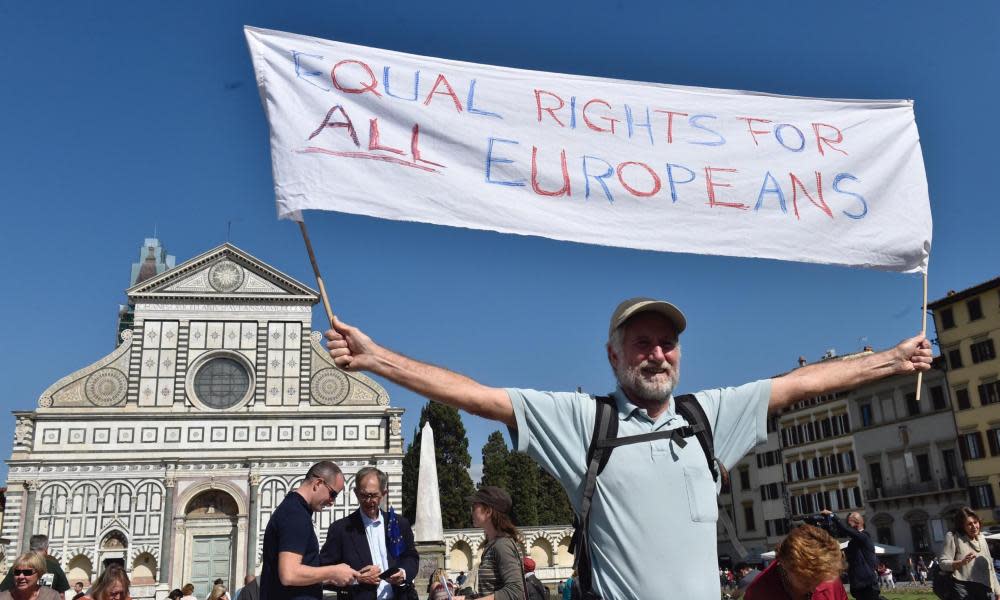Brexit threatens European social progress – leftwingers must speak up

Thirty years ago a French socialist, Jacques Delors, then president of the European commission, travelled to Bournemouth to speak to the British Trades Union Congress. Delors argued for a “social Europe” in a speech that contributed to swinging the mood among the British left, parts of which had long had misgivings about the European project – doubts that linger today.
Last week Emmanuel Macron, who has promoted the idea of a “Europe that protects”, travelled to London for a meeting with Theresa May. Yet for all the resemblance of his ideas to Delors’, Macron didn’t once say the words “social Europe”. This was a missed opportunity.
There is a strong, progressive case to be made for the European project these days. Brexit will be a social amputation for Britain – not a moment of emancipation for its lower middle classes. It will not deliver anything worthwhile to those who feel left behind. “Independence day” will be a blow to workers’ rights, to the struggle against inequality, to the fight for the environment. It certainly won’t bring protection.
Macron’s omission was understandable. May is a conservative – not a “progressive”, which is what Macron calls himself. Macron says he “respects” the “choice of the British people”, though he “regrets” it. But behind the scenes, French officials – like the Germans – are appalled by what is unfolding. Privately some say the British have “lost it”. The loan of the Bayeux tapestry is a fine symbol, but hardly a solution.
Talk of halting Brexit at this late stage may be pie in the sky. It may also bring to mind what Oscar Wilde once said about socialism: the problem with it is that it takes up too many evenings. But Europe’s social dimension is surely among the many arguments to be made in favour of reversing the referendum result. Last November in Gothenburg, the EU held a summit on the “European pillar of social rights”. Macron attended. The “social pillar” is a plan designed to promote fair wages, a minimum income, healthcare, gender equality, a better work-life balance, data protection, unemployment benefits, access to transport, and rights for disabled people. While it may be no more than a list of intentions, the social pillar is a good roadmap all the same.
It is too bad that there is no Delors-like figure around to take this message to leftwing British voters, activists and politicians. If voters are to be convinced that it might be better to hit the emergency brake before Britain careers off the rails altogether, they must first be informed about the protections the EU offers.
One of the reasons Delors met with success in Bournemouth in 1988 was Thatcherism – an experiment no continental European country has ever had to go through. For those Britons who fought Margaret Thatcher, and her sustained attack on the postwar social contract, the European Community (as it was then called) suddenly looked like a refuge – not a threat. Delors said protecting the weak and building solidarity were “vital” aspects of the “European model”.
ln this globalised world, the EU is our shield against the negative impact of unregulated capitalism
Labour’s leadership is embroiled in tactical games. It has also appeared unable, or unwilling, to reach out to progressive voices on the continent to help to stop Brexit and to shape an argument for a socially minded, fair and citizen-oriented Europe. Instead, it makes incomprehensible noises about the single market and the customs union. But as Delors once said, “no one falls in love with a market” (or a customs union, for that matter). What people can relate to emotionally is a collective struggle for values, decency, social fairness – and they can be made to feel proud to be part of something larger than their own country, if that something is made to work for the common good. In this globalised world, the EU is our common shield against the negative impact of unregulated capitalism, and the manipulations and illiberal practices of big corporations and large hostile powers.
The European project’s founding fathers were Christian democrats, not radical leftwingers. But in the decades that followed, socialists from France, Spain and Greece, as well as Scandinavian progressives, became its ambitious defenders. To be sure, in recent years we’ve seen an avalanche of leftwing criticism of the EU. Yet whatever conclusions one may want to draw from the Greek crisis or from tensions in Catalonia, it’s hard to overlook the fact that the very last thing either the Greeks or the Catalans want is to pull out of the EU.
Years ago Britain opted to stay out of the “social chapter” of the EU treaty. Delors at the time accused John Major of wanting to make the UK a “paradise for foreign investment” – a charge to which Thatcherites could happily plead guilty. Yet European progressives have been slow to reach out to Thatcher’s British victims.
And so the Brexit rollercoaster continues its wild ride while the European left looks on in indifference. Surely defending social rights is part of countering populism? Of course, stopping Brexit is a job for the British – but has Labour even thought about sitting down with representatives of Spain’s Podemos or with Nordic or German social democrats to discuss how to do it?
European governments won’t provide the answer to the question of how British public opinion might be swayed at this point. Their fatalism is only slightly tempered by hints that, should the British change their minds, they’d be welcome to stay in. But progressive, grassroots continentals (trade unionists, civil society activists, leftwing party members) take note: a little bit of socially minded outreach might help.
The debate about “social Europe” is ongoing on the continent. The Labour party seems cut off. That’s the bridge that ought to be built – urgently.
• Natalie Nougayrède is a Guardian columnist

 Yahoo News
Yahoo News 